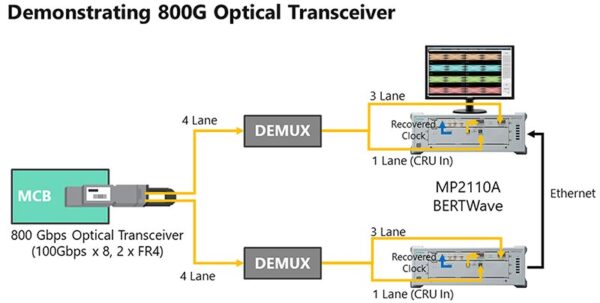 Anritsu Corporation (President Hirokazu Hamada) and CIG Photonics (CIG) are jointly demonstrating an 800G optical transceiver*1 PAM4 test solution in the Anritsu booth (#7B33) at CIOE 2022 to be held from December 7 to 9, 2022 in the World Exhibition and Convention Center, Shenzhen, China.
Anritsu Corporation (President Hirokazu Hamada) and CIG Photonics (CIG) are jointly demonstrating an 800G optical transceiver*1 PAM4 test solution in the Anritsu booth (#7B33) at CIOE 2022 to be held from December 7 to 9, 2022 in the World Exhibition and Convention Center, Shenzhen, China.
The test setup will input an 8-lane*2 optical signal from a CIG QSFP-DD800 2xFR4 800G optical transceiver to Anritsu’s MP2110A Sampling Oscilloscope to demonstrate measurement of key test parameters, including TDECQ*3.
With the explosive increase in network traffic levels due to the spread of services such as 5G, IoT, etc., optical connections, including optical transceivers, within and between data centers (DCI) are being upgraded to 400GbE. Additionally, to support expected rapid traffic increases caused by new future applications such as AI and machine learning, 800G optical transceivers are being developed, and first-generation 8-lane 100 Gbps PAM4*4 optical transceivers are now under test.
 With a built-in CRU*5, the MP2110A 4ch sampling oscilloscope is the ideal all-in-one solution for analyzing NRZ*6 and PAM4 Eye patterns of 10G-800G optical transceivers and devices. Combining a sampling oscilloscope and CRU in one tester facilitates easy and space-saving operation. This demonstration uses two MP2110A units to measure and analyze 800G optical transceiver 8-lane optical signals in parallel and cuts evaluation times by 50%. Anritsu hopes this test solution will help revolutionize data-center networks.
With a built-in CRU*5, the MP2110A 4ch sampling oscilloscope is the ideal all-in-one solution for analyzing NRZ*6 and PAM4 Eye patterns of 10G-800G optical transceivers and devices. Combining a sampling oscilloscope and CRU in one tester facilitates easy and space-saving operation. This demonstration uses two MP2110A units to measure and analyze 800G optical transceiver 8-lane optical signals in parallel and cuts evaluation times by 50%. Anritsu hopes this test solution will help revolutionize data-center networks.
The 800G transceiver under test is a CIG QSFP-DD800 2x400G-FR4 module. The optical interface conforms to 400GBASE-FR4 interface using dual 53.125 Gbaud PAM4 CWDM. The electrical interface conforms to 400GAUI-4 using 8-lane 53.125 Gbaud PAM4. The transmission distance is 2 km, and the max. power consumption is 16 W.
CIG Photonics Japan Vice President and Chief Technical Officer Koichi Tamura says, “The demand on 800G optical transceivers is strengthening due to rapidly increasing traffic in hyper-scale data centers and it is expected to be in mass-production for 25.6 Tbps switch applications in CY2023. At this time, we are very pleased to be cooperating with Anritsu with our high-quality and low-cost 800G optical transceivers based on our long-term experience in high-speed and high-density design and packaging technologies”.
Kohei Ota, General Manager of Anritsu’s Service Infrastructure Solutions Division says, “Anritsu is continuing to develop unique test solutions supporting improved optical transceiver development and mass-production efficiency. I am very proud of this joint demonstration with CIG of their leading-edge 800G optical transceiver. In addition to these solutions, we will continue to contribute to the realization of next-generation networks with increasing speed and capacity by providing device and network test solutions”.
About CIG
CIG Shanghai Co., Ltd (CIG) is a holding company with subsidiaries in China, USA, Japan and Germany. CIG has 4 business units, namely: Broadband BU (G/EPON, 10GPON, DSL, MOCA, etc. and Enterprise, carrier and datacenter switches), Wireless BU (Enterprise and Telco grade Wi-Fi, home routers and LTE/5G small cells), Photonics BU (Telecom client-side and DCI optical transceivers) and JDM customer BU (Key customer Joint Development and Manufacturing programs). CIG provides high quality R&D and state-of-the-art manufacturing collaborative services to the ICT industry. Millions of CIG products have been shipped and deployed worldwide each year.
Technical Terms
*1 Optical Transceiver: Hot-pluggable device that E/O and O/E-converts electrical and optical signals for high-speed data transmission using electrical signals at device side and optical signals at optical-fiber side
*2 Lane: Number of optical-transceiver I/O channels.
*3 TDECQ: Abbreviation for Transmitter and Dispersion Eye Closure Quaternary; index for evaluating PAM4 optical signal quality.
*4 PAM4: Abbreviation for Pulse Amplitude Modulation; amplitude modulation technology for increasing transmission capacity. PAM4 transfers 2 bits of data as 4 levels in one time slot.
*5 CRU: Abbreviation for Clock Recovery Unit; function for generating trigger signal from input data signal. Although sampling oscilloscopes require a trigger signal synchronized to the data signal, a CRU permits observation of the waveform of transmission equipment without a trigger signal.
*6 NRZ: Abbreviation for Non-Return to Zero; one technology for transmitting digital data.


